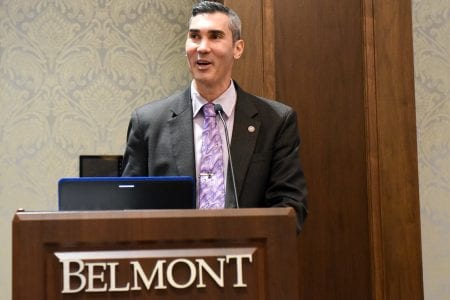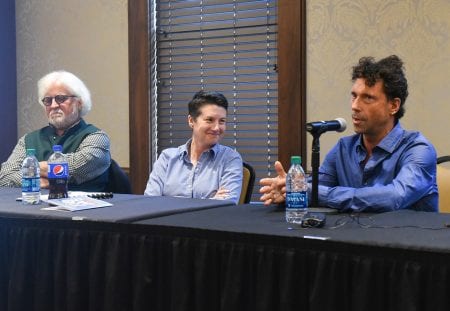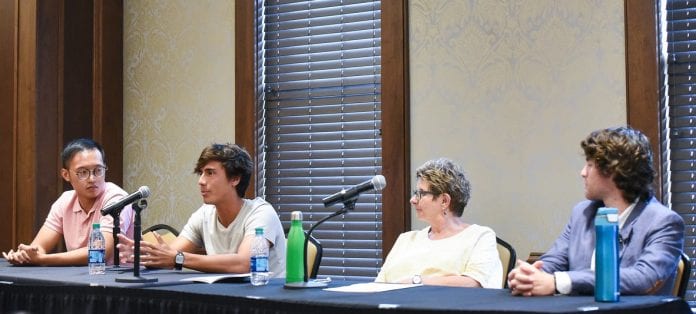The 16th annual Humanities Symposium wrapped up an insightful week of exploring the theme “Making It Home” with more than 30 speakers examining the topic through a variety of disciplines and perspectives. One of the week’s first events featured a panel of three international students–senior audio engineering technology and computer science major Sebastián Alegre (Peru), senior accounting and finance major Caio Niel (Brazil) and junior finance major King Ching Sit (Hong Kong)–and one international faculty member–Associate Professor of German Dr. Regine Schwarzmeier–to discuss their interpretations of the word “home” and how they found a home at Belmont.
Each of the participants agreed that “home” refers to a feeling more than a place. According to Sit, “Home is a place where you feel loved and you feel like a part of a group,” and Alegre added that “home is a feeling of comfort.”
The panel also emphasized the importance of the language barrier. Alegre asserted that “we [international students] feel at home when we speak our language,” and even added that communicating in a foreign language changes his personality. Schwarzmeier explained that there are “certain things that come naturally to us in our culture that does not translate” and “no matter how well you know a foreign language, there will always be a little barrier” introduced by cultural differences.
In order to combat homesickness, Niel emphasized the importance of his surrogate family. “You want to make yourself at home where ever you are,” he said. “Here, I have a team, and they are my family at Belmont.” Sit added, “If I want to feel at home on campus, I must immerse myself in the culture… I missed [his family] in my heart, so I tried to call everyday… but I immersed myself at the same time.” Schwarzmeier, who has lived in the United States for four decades, had a different perspective on homesickness: “In Germany, we have a word for homesickness, but we also have a word for the longing to go into the world, so, for me, the longing to explore takes over my homesickness.”

To conclude the discussion, the panelists reflected on their feeling of home at Belmont. Niel said, “The culture we have at Belmont makes my life easier and makes me feel at home.” The panelists also agreed that the typical friendly nature of Nashville helped to make them feel at home. Schwarzmeier closed the discussion with a recommendation to all Belmont students to spend time abroad immersing themselves in the culture and the language. “If more of us would be willing to plunge into another culture,” then she predicts that students will accrue a much greater awareness and patience.
Another Humanities Symposium session invited Tennessean Opinion Engagement Editor David Plazas to share his thoughts on “The cost of growth and change in Nashville.” His convo examined how quickly the growth boom has occurred in the city as well as the lack of infrastructure to deal with that growth. Lack of efficient transit and affordable housing are two key problems the city must deal with, and quickly. “If this is the city we want to be, then that’s one thing,” he noted. “But we are going to leave two-third of our citizens behind.”
He then opened the conversation to the audience and invited students to share their thoughts. Many expressed concerns that as graduates they will be unable to afford to stay in Nashville due to rising rents across the city and the inability to leave outside the cit core without effective transit systems in place.

The symposium also featured a few key speakers from other institutions including University of Denver’s Dr. Jere Surber (The Dark Side of Home – Or How a Famous 20th Century Philosopher Became a Nazi), Vanderbilt Divinity School’s Dr. Melissa Snarr (The Migrants’ God: Christianity, “Home,” and Just Hospitality), Vanderbilt’s Dr. Robert Barsky (Are We Home Yet? The Uncertainties of Vulnerable Migrants’ First Encounters with the Host Country) and Indiana University’s Dr. Scott Sanders (Making a Home in a Restless World).
Sanders also led a conversation after the viewing of “Look & See: A Portrait of Wendell Berry.” The documentary revolves around the divergent stories of several residents of Henry County, Kentucky who each face difficult choices that will dramatically reshape their relationship with the land and their community.
Dr. Natalia Pelaz, professor in the Foreign Languages Department, who coordinated this year’s symposium, discussed the importance of studying the evolution and fluidity of the concept of “home.” “In an increasing mobile human experience, the notion of home has become a flexible, fluid concept. In arguing about its meanings and implications, we must problematize discourses of inclusivity and exclusivity; belonging and displacement; individual and collective identity formation; localism and globalism.”



